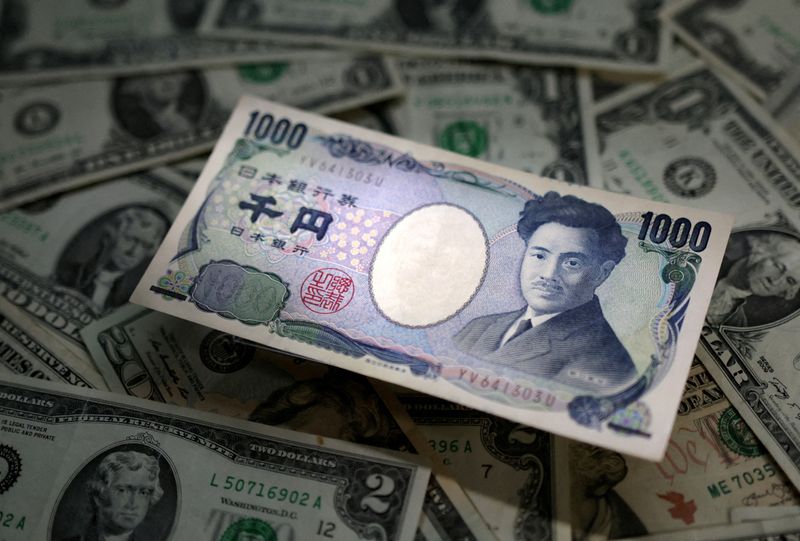By Jamie McGeever
(Reuters) - A look at the day ahead in Asian markets.
Asian stocks should open on Monday buoyed by Friday's tech-led surge on Wall Street, while investors will be scrambling to make sense of the latest twist in the Japanese yen's extraordinary helter-skelter slide against the dollar and other currencies.
The yen fell to a fresh 34-year low of 157.79 per dollar on Friday after the Bank of Japan left interest rates on hold, as expected, but failed to signal any meaningful concern about the exchange rate.
With the Ministry of Finance still opting not to authorize yen-buying intervention by the BOJ, traders went in full steam. Levels that until recently had been unthinkable, like 160 per dollar or even 170, are no longer so fanciful.
Most observers would probably have expected Tokyo to act by now. It last intervened in September and October 2022 when the dollar was around 146.00 and 152.00 yen, respectively.
But it hasn't, and there are good reasons for that: contrasting U.S. and Japanese inflation data, yawning U.S.-Japanese yield differentials, and the benefits of weak yen to Japan's asset markets, corporate profits, tourism and all-round competitiveness.
On the other hand, speculators are licking their lips. The latest U.S. futures market data on Friday showed that hedge funds are sitting on their largest short yen position in 17 years and second largest ever.
These CFTC figures are for the week through last Tuesday, and the yen has fallen another 2% since then.
Japanese officials have expressed their disquiet with the yen's weakness, but the longer that talk is not backed up with action, the more hollow it rings. Will traders have 160.00 dollar/yen in their sights this week? You would think so.
Other countries in Asia are becoming increasingly uncomfortable with exchange rate developments - Indonesia has raised rates to counter the rupiah's weakness, Vietnam and India have intervened directly in the FX market buying their currencies, and South Korea has indicated it will follow suit.
Looking to the week ahead, the U.S. Federal Reserve's policy decision on Wednesday may tempt FX and other markets to play it safe for the next few days.
Stocks appear to have shaken off the wobbles after post-earnings rallies in Alphabet (NASDAQ:GOOGL) and Tesla (NASDAQ:TSLA) shares, in particular, boosted a broader recovery on Wall Street. The S&P 500 has recouped half its losses from earlier this month, the Nasdaq and MSCI Asia ex-Japan even more.
Highlights from the Asian economic calendar this week include Chinese PMIs, Bank of Korea meeting minutes, inflation from South Korea and Indonesia, and Hong Kong GDP.
Figures on Saturday from Beijing, meanwhile, showed that industrial profits in China fell 3.5% in March, slowing the cumulative rise in the quarter to 4.3% from 10.2% in the first two months of the year.
Also in China, Tesla CEO Elon Musk on Sunday arrived on an unannounced visit in Beijing, where he met Premier Li Qiang.
Here are key developments that could provide more direction to markets on Monday:
- Thailand trade (March)

- Singapore unemployment (Q1)
- Singapore business expectations (Q1)
(Reporting and Writing by Jamie McGeever)